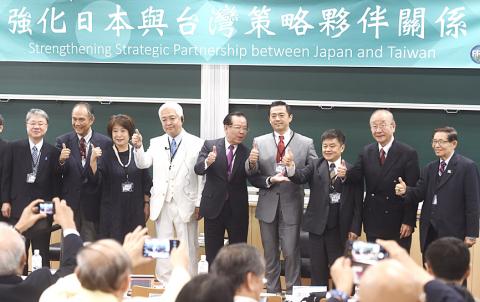Japan should enforce a law parallel to the US’ Taiwan Relations Act (TRA) to consolidate its partnership with Taiwan, Jikido Aeba, a Japanese lawmaker and academic, told a seminar in Taipei yesterday.
He is also concerned about Taiwan’s security in the face of mounting Chinese pressure, Aeba told a seminar titled Strengthening Strategic Partnership between Japan and Taiwan, which was organized by the Formosa Republican Association and the Japanese Conservative Union (JCU) at National Taiwan University.
Taiwan’s future is at stake in its presidential and legislative elections on Jan. 11, while it is expected to face more pressure from China after the elections, said Aeba, who is chairman of the JCU.

Photo: Chien Jung-fong, Taipei Times
While many Japanese hope support for Taiwan can be bolstered, the past 70 years has seen mostly economic collaboration, he said.
Democratic partners, such as Japan, the US, India, Australia and South Korea, should support Taiwan, while Tokyo should announce that it would guard Taiwan if it faces security threats, he said.
The Japanese government should establish a Taiwan-Japan relations bill, while amending its constitution to enable the Japan Self-Defense Forces to defend its Asian partners, he said.
It is important for Japan that Taiwan maintains its democracy and freedoms, said Genki Fujii, a Japanese academic of international affairs.
If Taiwan were annexed by China, Japan’s security, economy and social prosperity would be affected as well, Fujii said, adding that the destinies of Taiwan and Japan are closely tied.
Taiwan has followed Japan in its economic development and grown into a democracy, and its political and economic achievements are remarkable in Asia, he said.
By contrast, China falsely claims to have a capitalist system, but it steals ideas from other countries, he said.
He asked how China could lead a nation as advanced as Taiwan.
As an outsider, Taiwan is a great country, Fujii said, calling on Taiwanese to be more confident.
Taiwan-Japan ties should be consolidated through legislation, he said, adding that the Japanese government should enforce a parallel version of the TRA.
While the issue is not yet on the Japanese government’s agenda, some lawmakers have expressed an interest in it, he said, adding that the JCU would continue lobbying for the issue, even though it might take some time.
Steve Bannon, a former White House strategist for US President Donald Trump, gave a recorded speech at the seminar.
Taiwan’s elections next month are about defending independence and freedom, which is far more important for the region and the entire world, especially as the Chinese Communist Party continues to enslave its people and threaten regional order, Bannon said.

INVESTIGATION: The case is the latest instance of a DPP figure being implicated in an espionage network accused of allegedly leaking information to Chinese intelligence Democratic Progressive Party (DPP) member Ho Jen-chieh (何仁傑) was detained and held incommunicado yesterday on suspicion of spying for China during his tenure as assistant to then-minister of foreign affairs Joseph Wu (吳釗燮). The Taipei District Prosecutors’ Office said Ho was implicated during its investigation into alleged spying activities by former Presidential Office consultant Wu Shang-yu (吳尚雨). Prosecutors said there is reason to believe Ho breached the National Security Act (國家安全法) by leaking classified Ministry of Foreign Affairs information to Chinese intelligence. Following interrogation, prosecutors petitioned the Taipei District Court to detain Ho, citing concerns over potential collusion or tampering of evidence. The

‘FORM OF PROTEST’: The German Institute Taipei said it was ‘shocked’ to see Nazi symbolism used in connection with political aims as it condemned the incident Sung Chien-liang (宋建樑), who led efforts to recall Democratic Progressive Party (DPP) Legislator Lee Kun-cheng (李坤城), was released on bail of NT$80,000 yesterday amid an outcry over a Nazi armband he wore to questioning the night before. Sung arrived at the New Taipei City District Prosecutors’ Office for questioning in a recall petition forgery case on Tuesday night wearing a red armband bearing a swastika, carrying a copy of Adolf Hitler’s Mein Kampf and giving a Nazi salute. Sung left the building at 1:15am without the armband and apparently covering the book with a coat. This is a serious international scandal and Chinese

Seventy percent of middle and elementary schools now conduct English classes entirely in English, the Ministry of Education said, as it encourages schools nationwide to adopt this practice Minister of Education (MOE) Cheng Ying-yao (鄭英耀) is scheduled to present a report on the government’s bilingual education policy to the Legislative Yuan’s Education and Culture Committee today. The report would outline strategies aimed at expanding access to education, reducing regional disparities and improving talent cultivation. Implementation of bilingual education policies has varied across local governments, occasionally drawing public criticism. For example, some schools have required teachers of non-English subjects to pass English proficiency

TRADE: The premier pledged safeguards on ‘Made in Taiwan’ labeling, anti-dumping measures and stricter export controls to strengthen its position in trade talks Products labeled “made in Taiwan” must be genuinely made in Taiwan, Premier Cho Jung-tai (卓榮泰) said yesterday, vowing to enforce strict safeguards against “origin laundering” and initiate anti-dumping investigations to prevent China dumping its products in Taiwan. Cho made the remarks in a discussion session with representatives from industries in Kaohsiung. In response to the US government’s recent announcement of “reciprocal” tariffs on its trading partners, President William Lai (賴清德) and Cho last week began a series of consultations with industry leaders nationwide to gather feedback and address concerns. Taiwanese and US officials held a videoconference on Friday evening to discuss the